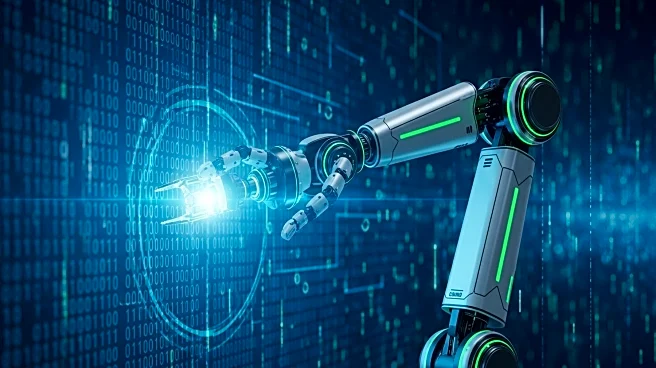What's Happening?
The latest State of Smart Manufacturing Report from Rockwell Automation Inc. highlights a significant shift in the manufacturing sector's approach to cybersecurity. As cyber risks become a top business issue, second only to economic conditions, manufacturers are increasingly turning to artificial intelligence (AI) and machine learning (ML) to bolster their defenses. The report indicates that 61% of cybersecurity and IT professionals plan to adopt AI and ML for security purposes within the next year. This trend is driven by the growing integration of information technology (IT) and operational technology (OT) in smart manufacturing operations, which has heightened the risk of cyber threats. The report also notes that nearly half of cybersecurity professionals see securing converging IT/OT architecture as crucial for achieving positive outcomes over the next five years.
Why It's Important?
The adoption of AI and ML in cybersecurity is crucial for the manufacturing sector, which faces increasing threats due to the interconnectedness of digital and physical infrastructures. As cyber threats rank among the most serious external risks, the ability to protect against these threats is vital for maintaining manufacturing growth and competitiveness. The focus on cybersecurity is also influencing workforce development, with a growing demand for skilled professionals in cybersecurity and analytical roles. This shift underscores the need for manufacturers to align technological advancements with human resource development to ensure robust cybersecurity measures are in place.
What's Next?
As manufacturers continue to integrate AI and ML into their cybersecurity strategies, the focus will likely expand to include supply chain management and quality control. One-third of respondents in the Rockwell report plan to use AI and ML to manage supply chains, while half intend to apply these technologies to support quality control. This indicates a broader application of AI beyond cybersecurity, potentially transforming various aspects of manufacturing operations. Additionally, the emphasis on cybersecurity skills in workforce development suggests that educational and training programs may need to adapt to meet the growing demand for expertise in this area.
Beyond the Headlines
The increasing reliance on AI and ML for cybersecurity in manufacturing raises ethical and legal considerations, particularly regarding data privacy and the potential for AI-driven decision-making to impact human jobs. As AI becomes more integrated into manufacturing processes, companies will need to navigate these challenges while ensuring compliance with regulations and maintaining public trust.








